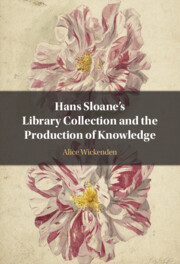Book contents
- Hans Sloane’s Library Collection and the Production of Knowledge
- Hans Sloane’s Library Collection and the Production of Knowledge
- Copyright page
- Contents
- Illustrations
- Tables
- Acknowledgements
- Introduction
- Chapter 1 Hans Sloane’s Library
- Chapter 2 Plants and/as Books
- Chapter 3 Repeating Books
- Chapter 4 Unreadable Books
- Chapter 5 Image Books
- Conclusion
- Appendices
- Bibliography
- Index
Chapter 5 - Image Books
Pictures, Paper, and Provenances
Published online by Cambridge University Press: 20 November 2025
- Hans Sloane’s Library Collection and the Production of Knowledge
- Hans Sloane’s Library Collection and the Production of Knowledge
- Copyright page
- Contents
- Illustrations
- Tables
- Acknowledgements
- Introduction
- Chapter 1 Hans Sloane’s Library
- Chapter 2 Plants and/as Books
- Chapter 3 Repeating Books
- Chapter 4 Unreadable Books
- Chapter 5 Image Books
- Conclusion
- Appendices
- Bibliography
- Index
Summary
This chapter returns to the establishment of the British Museum, focusing on Sloane’s prints and drawings. It looks at his categorisation of visual material and the subsequent division of that material, focussing on the historical distinctions between ‘miniatura’ and ‘prints’ and the importance of something being framed or unframed. Taking examples of items which have been categorised as different things across the spectrum of printed images to printed text, the chapter ultimately argues that provenance is inherently paratextual and that how something is presented changes what it can be. A set of drawings initially owned by John Locke, now found between the British Library and the British Museum, demonstrates the forces of arbitrary chance and individual decisions on the subsequent survival and classification of an object. Finally, the chapter considers the importance of paper within a library, as a determining feature both materially and metaphorically,
Keywords
Information
- Type
- Chapter
- Information
- Hans Sloane's Library Collection and the Production of Knowledge , pp. 168 - 200Publisher: Cambridge University PressPrint publication year: 2025
